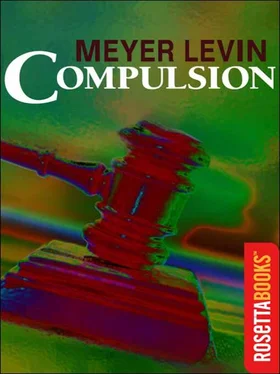“He wrote one book, Beyond Good and Evil , which was a criticism of all moral codes as the world understands them – a treatise holding that the intelligent man is beyond good and evil, that the laws for good and the laws for evil do not apply to those who approach the superman. Judd Steiner is not the only boy who has read Nietzsche. He may be the only one who was influenced in the way he was influenced.”
Today we know that more, far more were influenced, or thought they recognized in Nietzsche something of their own selves. There in 1924, in the Chicago courtroom, far from the Munich where another Nietzschean began his march in 1924, the tocsin for the era was scarcely heard.
Jonathan Wilk walked back to the defence table and picked up some notes. “I have made a few short extracts from Nietzsche. These would not affect you. They would not affect me. The question is how these works did affect the impressionable, visionary, dreamy mind of this boy. Here are some of the things which Nietzsche taught:
“‘Why so soft, oh my brethren? Why so soft, so unresisting and yielding? This new table, oh my brethren, I put over you: Become hard. To be obsessed by moral consideration presupposes a very low grade of intellect. We should substitute for morality the will to our own end, and consequently to the means to accomplish that.’”
His own voice hardened by the words, Wilk went on. “‘A great man, a man that nature has built up and invented in a grand style, is colder, harder, less cautious and more free from the fear of public opinion.’”
He spoke directly to Judd, as to a misunderstanding pupil. “This was a philosophical dream, containing more or less truth, that was not meant by anyone to be applied to life.” Wilk went on to quote a scholarly appraisal: “‘Although no perfect superman has yet appeared in history, Nietzsche’s types are to be found in all the world’s great figures – Alexander, Napoleon – in the wicked heroes such as the Borgias, Wagner’s Siegfried and Ibsen’s Brand, and in the great cosmopolitan intellects such as Goethe and Stendhal. These were the gods of Nietzsche’s idolatry. The superman-like qualities supposedly lie not in their genius, but in their freedom from scruple. They felt themselves to be above the law. So the superman will be a law unto himself. What he does will come from the will and superabundant power within him.’”
An excited gleam had come to Judd’s eyes. Was Wilk defending him now? And the great accusatory question stood forth in those eyes: How was anyone to know whether the will to power led to good or to evil?
But the moment passed. Wilk seemed to shake himself out of his abstraction and slowly to load upon himself again the burden of defence. “Your Honour, this philosophy became part of his being. He lived it and practised it. Now, he could not have believed it, excepting that it either caused a diseased mind or was the result of a diseased mind.
“Here is a boy who by day and by night, in season and out, was talking of the superman, owing no obligations to anyone, believing whatever gave him pleasure he should do – believing it just as another man might believe a religion.
“You remember that I asked Dr. Ball about these religious cases and he said, ‘Yes, many people go to the insane asylum on account of them.’ I asked Dr. Ball whether the same thing might come from a philosophical belief, and he said, ‘If one believed in it strongly enough.’ And we know this about Nietzsche: He was insane for fifteen years before the time of his death. His very doctrine is a species of insanity.”
Judd’s mouth opened. Then he sank back.
“Here is a man,” Wilk continued, “who made his impress upon the world. Every student of philosophy knows him. His doctrines made him a maniac. And here is a young boy in the adolescent age, harassed by everything that harasses children, who takes this philosophy and believes it literally. It is his life. Do you suppose this mad act could have been done by him in any other way?
“He did it, obsessed of an idea, perhaps to some extent influenced by what has not been developed publicly in this case – perversions that were present in the boy.” Intimately, to the judge, he said,” Both are signs of insanity, both, together with this act, proving a diseased mind.
“Why should this boy’s life be bound up with Friedrich Nietzsche, who died twenty-four years ago, insane, in Germany? I don’t know. I only know it is.
“I know, Your Honour, that every atom of life in all this universe is bound up together. I know that a pebble cannot be thrown into the ocean without disturbing every drop of water in the sea. I know that every life is inextricably mixed and woven with every other life. I know that every influence, conscious and unconscious, acts and reacts on every living organism, and that no one can fix the blame. I know that all life is a series of infinite chances, which sometimes result one way and sometimes another. I have not the infinite wisdom that can fathom it; neither has any other human brain. But I do know that if back of it is a power that made it, that power alone can tell, and if there is no power, then it is an infinite chance, which man cannot solve. Tell me that you can visit the wrath of fate and chance and life and eternity upon a nineteen-year-old boy! If you could, justice would be a travesty and mercy a fraud!”
Then if it was the encounter with Nietzsche’s philosophy that had drawn out a capacity for evil in Judd, who was to blame for that encounter? Could the publishers of Nietzsche’s works be blamed? Could the university be blamed? “I do not believe that the universities are to blame. I do not think they should be held responsible. I do think, however, that they are too large, and that they should keep a closer watch, if possible, upon the individual.
“But you cannot destroy thought because, forsooth, some brain may be deranged by thought. It is the duty of the university, as I conceive it, to be the great storehouse of the wisdom of the ages, and to let students go there, and learn, and choose. Every changed idea in the world has had its consequences. Every new religious doctrine has created its victims. Every new philosophy has caused suffering and death. Every new machine has carved up men while it served the world. No great ideal but does good and harm, and we cannot stop because it may do harm.”
He paused there; he seemed to have done with Judd’s philosophy, and on Judd’s face there came a blank look – was he thus meagrely explained to the world? Was this all his life was worth?
“Your Honour, there is something else in this case that is stronger still than the elements I have spoken of before. There is the element of chance. These boys, neither one of them, could possibly have committed this act except by coming together. It was not the act of one; it was the act of two.
“Your Honour, I am sorry for poor Paulie Kessler, and I think anybody who knows me knows that I am not saying it simply to talk. I do not know what Paulie Kessler would have been had he grown to a man. But would it mean anything if on account of that death, these two boys were taken out and a rope tied around their necks and they died felons? No, Your Honour, the unfortunate and tragic death of Paulie Kessler should mean an appeal to the fathers and the mothers, to the teachers, to the religious guides, to society at large. It should mean an appeal to all of them to appraise children, to understand the emotions that control them, to understand the ideas that possess them, to teach them to avoid the pitfalls of life.”
As he began again in the afternoon, he was once more the skilled lawyer making his points. He came to the sorest point, the testimony of McNamara about a “friendly judge”.
Читать дальше












